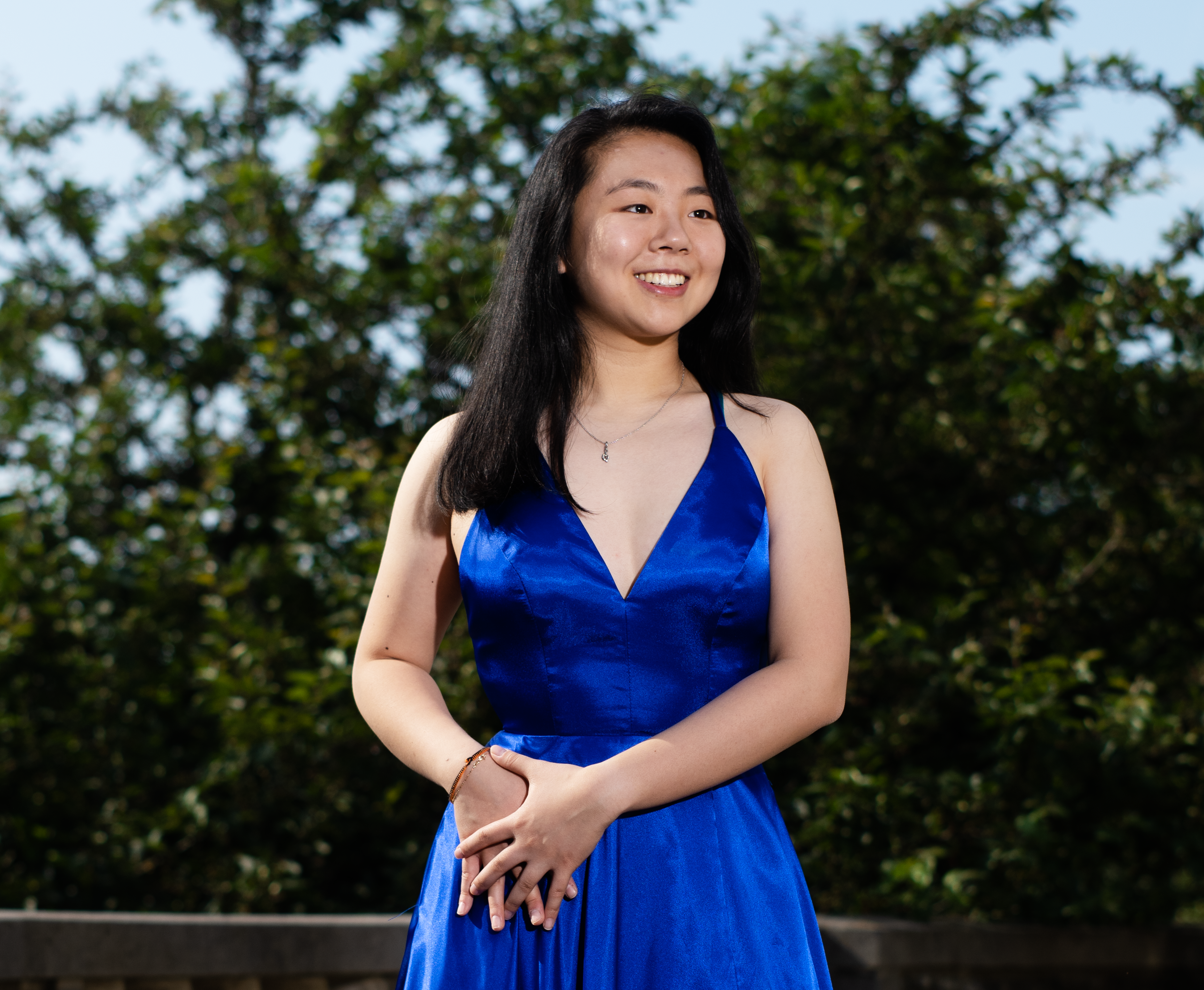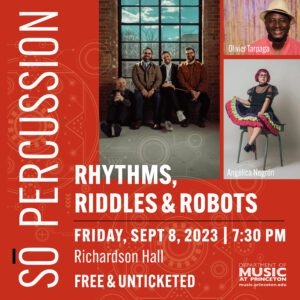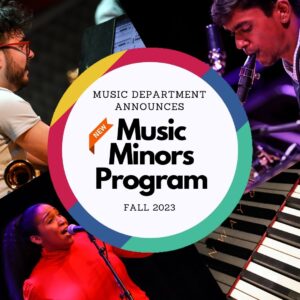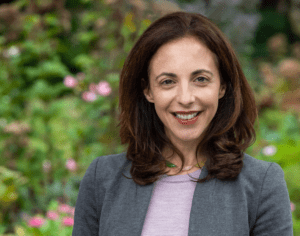The Department of Music congratulates Kasey Shao (Class of 2025), a Music Major who is pursuing Minors in Piano Performance and Engineering Biology, who was one of two students named 2024 Gilmore Young Artists. We caught up with Kasey this summer following the official announcement to discuss how she found out she’d been selected, what she has planned for her 2024 Gilmore recitals and piano commission, and what’s on the docket for her final two years at Princeton.
Kasey, you’ve been named one of 2024 Gilmore Young Artists, which includes a $15,000 stipend to further your musical development, $10,000 to commission a new piano composition, and a six-concert tour of recital and orchestral performances this spring. How did you find out you had been named a Gilmore Young Artist?
I was actually in the middle of an Orgo [Organic Chemistry] office hour when I got the phone call from Pierre [van der Westhuizen], the artistic director of the Gilmore Foundation. The nomination process is completely anonymous, so Pierre calling to tell me that I was a Gilmore Young Artist completely blew me away. The Gilmore has been one of my biggest dreams for a long time. I was overwhelmed and incredibly honored to be joining such a supportive and diverse family of artists.
Besides telling your family, you had to keep the news a secret for quite a long time, is that right?
Yes, I got the phone call in May and the official announcement was made in July, so I couldn’t tell anyone for months. It was an interesting months-long balance of celebrating with my family but also not telling too many people. I remember going back to office hours and my TA asking if everything was all right I was just like, yeah! I couldn’t say anything else!
In the past, the Gilmore has typically gone to students pursuing primarily piano performance, but that’s not the case for you and Harmony Zhu, the other winner, who exemplify a sort of duality between music and academics. This duality has been baked into the fabric of your life from day one because your mom is an artist and your dad is a scientist, hasn’t it?
I remember dinner and road-trip conversations always having this sort of duality. Even earlier, I remember very fondly whenever my brother, who’s six years older than me and now in his residency, went to the music store for new violin strings, I would always tag along just because I liked banging on the drums and the keyboard. My mom was very supportive of me going on this musical route. She was an art teacher in China, and coming here to America, she was still in the arts education field, so she knew the importance of introducing the arts to a very young, very hyper kid. But also my dad’s a researcher who studies lupus nephritis. Again, from a young age, I remember him having just stacks and stacks of research papers that he’d be reading and analyzing and asking questions of. Seeing him work instilled in me this idea that there’s always more to everything — that there are always different questions that haven’t yet been asked. And I applied that very naturally to my musical side: when you view something like the Bach first Prelude And Fugue from different angles you understand so much more about what Bach was doing when he sat down and thought of this idea of having a Well Tempered Clavier. I think it’s just incredible, the kind of brain work and mind bending that can happen when you’re at the piano.
My dad also got me interested in science, of course, and in the pathways to studying science. I started taking more advanced biology classes and found an interest in developmental biology. Although I’m a Music Major, I’m also getting a Minor in Piano Performance and a Minor in Engineering Biology, which has been one of my dreams since I started. Being stuck at home during COVID, my family and I would watch a lot of medical documentaries together, one of which was on the first double hand transplant on a child. For me, as a pianist, thinking of someone who doesn’t have the ability to create music themselves through an instrument was really heartbreaking. Knowing that simple surgeries, sometimes five-minute and ten-minute surgeries, can completely change someone’s life made me consider medical school. So, I’ve been trying to take advantage of the support that Princeton provides for students to do as many things as they can and want to: performance, composition, and pre-med. It’s really special that this year the Gilmore has chosen to support musicians who embody this duality.
You chose to declare as a Music Major, even though you were strongly considering Molecular Biology. What factors guided your decision?
The first music class that I ever took, Musical Modernism, was taught by Simon Morrison. I knew some of the history and had played some of the pieces before, but I had never learned about the music or the time period in so much depth and with such passion. I immediately realized there was so much more to music that I didn’t know, that I needed to know, and that I could learn about here at Princeton in the Music Department. As a composer, taking Barbara White’s composition class was an incredible opportunity: she supported all the weird ideas I had about composing, giving me lists of composers to listen to and spark ideas. Sō Percussion’s rhythm class also opened my eyes — to the worlds of jazz rhythms, Indian rhythms, and so forth. And Jeff Snyder, whose electronic composition class I took, really got me into composing; before that class, I thought of composing as this hard, abstract thing that people like Mozart could just automatically come up with in their brains. But that class was a fun, explorative project of, like, here are some algorithms, so go do what you want, be random, make sounds and noises, do whatever you can, and see what’s possible. The idea was that anything is possible. That really broke down this barrier of “I can’t compose,” and pushed me into this world of composition.
But what really influenced my decision was just how supportive everyone in the department was of my pre-med work as well. Gavin Steingo was very supportive of my medicine and music path. He told me that students have created instruments, composed pieces, created hearing devices for people who are hard of hearing to enjoy music. And I was like, wait, aren’t we a music department? It was mind blowing the ideas that students came up with and the support they receive from the department. Even the fact that the Music Department provides private lessons, which I take with Dr. Margaret Kampmeier, or that I can talk through ideas with internationally-renowned graduate students through the Music Mentoring Program, or that I can reach out to any of the available graduate students who are in the composition program and take free lessons with them — I mean, it’s incredible. Gavin assured me from day one, no matter what I need, in terms of timing, recitals, taking extra classes, whatever, we’re here for you. I think it’s incredibly warm how close-knit the Music Department family is. Ruth Ochs, the director of Sinfonia, has also been an incredible supporter of not only music and medicine, but my entire academic journey, as has Lou Chen, the director of Trenton Arts at Princeton. And I’ve had so much support from professors in the Department of Molecular Biology too, like professors Burdine and Devenport, whose course on developmental biology really influenced me and who always spent extra time answering my weird questions about muscle pathologies, muscle atrophy, things like that. Truly, everyone I’ve talked to in Mol Bio has been like, yeah, you’re a Music Major, but who cares? Come into our lab, listen to our group meetings. I’ve never been in an environment like this, where anything is on the table in terms of academic exploration.
Speaking of academic exploration, what’s on the docket for the next two years?
I’m looking forward to working with one of the faculty advisors on my junior paper, which I’m hoping is going to be one piece out of a larger electronic/piano suite that I’ll write for my senior thesis on the theme of what it means to be a person existing within multiple communities. I’m an Asian American female, Chinese specifically, but I’m also part of the Princeton, New Jersey, Cincinnati, and broader United States communities. I think this overlap of communities translates into music in a really interesting way, which I’m excited to get on paper and explore. I’ll also be giving a senior performance and, hopefully, a junior recital, which will be like a little snapshot of the repertoire I’ll be performing on the Gilmore performance tour: I’ll be playing Bach’s Partita No. 5 in G Major, the Bolcom Nine Bagatelles, Chopin’s Andante Spianato, and Liszt’s Réminiscences de Norma, alongside works that showcase the Asian American voice, including Chen Yi’s Duo Ye, which takes influences from one of the smaller nationalities within China and their traditional dances and singing. Duo Ye is a very good representation of what it means to be Chinese, to be Asian, and the piece has definitely brought me closer to my Chinese roots.
I’m also very focused on the idea of music as enjoyment and fun. My first piano teacher really guided me in that direction: he’d give me a song about snakes and tell me that, when I was playing it, I should think about how snakes move and let that impact the way that I think about the notes and how they’re connected in the musical line. These experiences very much impacted the way I think about music now. My goal in programming these recitals has really been making sure not only that I have fun but also that the audience enjoys interacting with these pieces too, whether in Princeton, Michigan, or elsewhere.
You’ll also be commissioning a new piano composition, which you’ll have the exclusive rights to perform for one year. How might these ideas of community and fun come into play in that commission?
We haven’t started the process yet, but I’ve definitely been thinking about it. Again, I am hoping to showcase that Asian American voice, especially the Asian American female voice, which I think is so overlooked especially in the United States. Last year, I took an Anthropology class called Asian American Perils: Virus, Vermin, Machine, taught by Jerry C. Zee. It was an incredibly eye opening class that really put into perspective what being Asian American means and how that definition changes across different communities, across different racial groups, across different economic lines. It’s a sort of uncomfortable topic to talk about, but I think it’s something that needs to be talked about. For my final project, I focused on the arts, specifically visual art. When we look at someone speaking, we interpret their words from their standpoint of what that person looks like, and that biases our interpretation of their words. When we look at art, however, we don’t see the person who created it. And so, if you look at art, you just think, oh, this looks nice or this artwork speaks to me. I think it’s empowering for young Asian American females to put their voice out there in this way that doesn’t necessarily invoke bias or negativity. My Gilmore commission is definitely going to be my way of supporting Asian American women and their voices. It will also enable me to bring a sort of cultural splash into the musical world.
Can we expect to hear the piece performed at Princeton?
I definitely do want to perform it here at Princeton. I’m also definitely hoping to take advantage of future Gilmore performances to showcase the work, along with community performances, too. I love doing community performances. They’re a great way to just interact with people and to share love and joy.
As for balancing your performing career possibly with med school…
Medical school is definitely a very big process that I’m slowly getting started on, but whatever I do in my life, whether it’s being a pianist or being a hand surgeon, I’m definitely going to have piano and performing as a large part of my life. I guess I’ll just be using more of my incredible time management skills! Truly, I’m so grateful for the incredible opportunities there are at Princeton that enable any student who comes in, no matter their background, no matter their culture, no matter their language, no matter what they’re interested in, to find their meaning and their passion.
Congratulations, Kasey!
In Other News
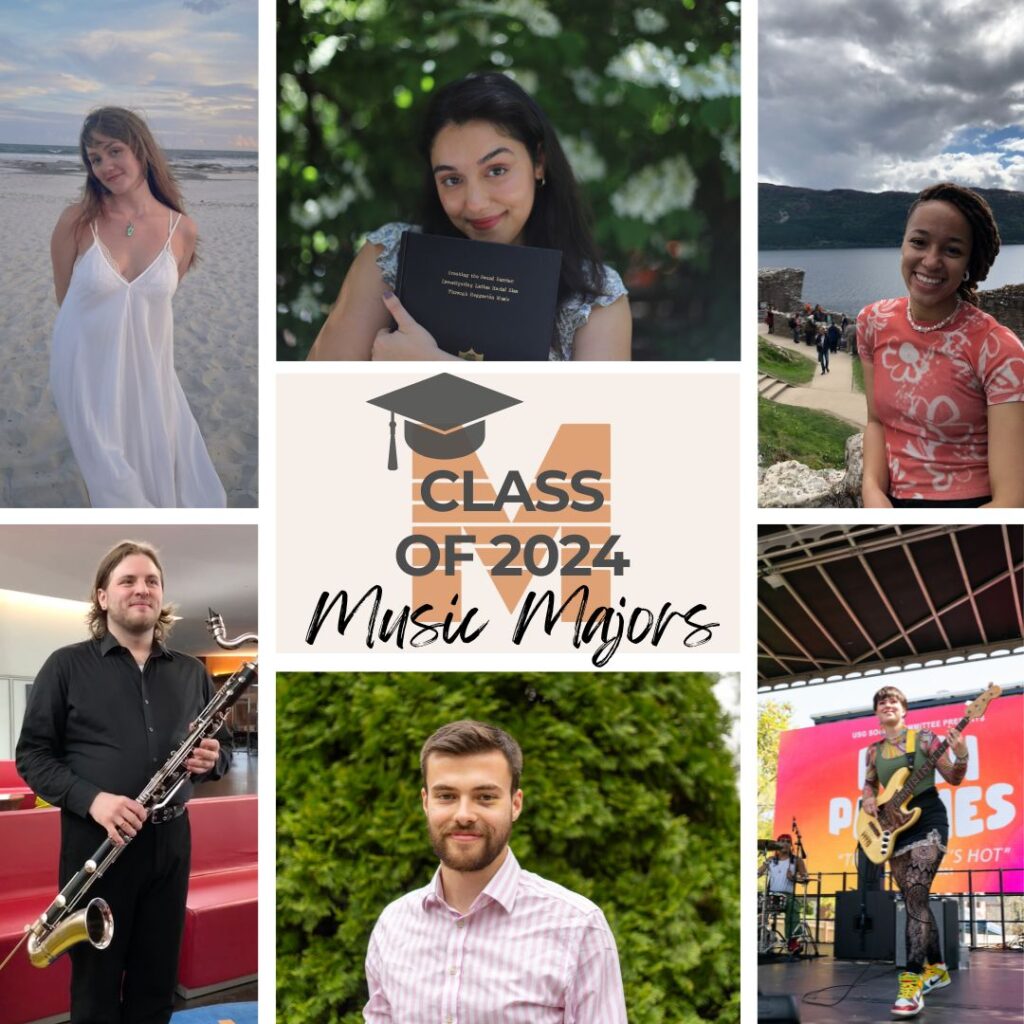
What Six Senior Music Majors’ Say About Their Theses
May 16, 2024
As we near the final weeks of spring semester and anticipated graduation for the Class of 2024, the Music Department asked six Senior Music Majors to expand on their creative thesis, as well as share words of encouragement to future students.
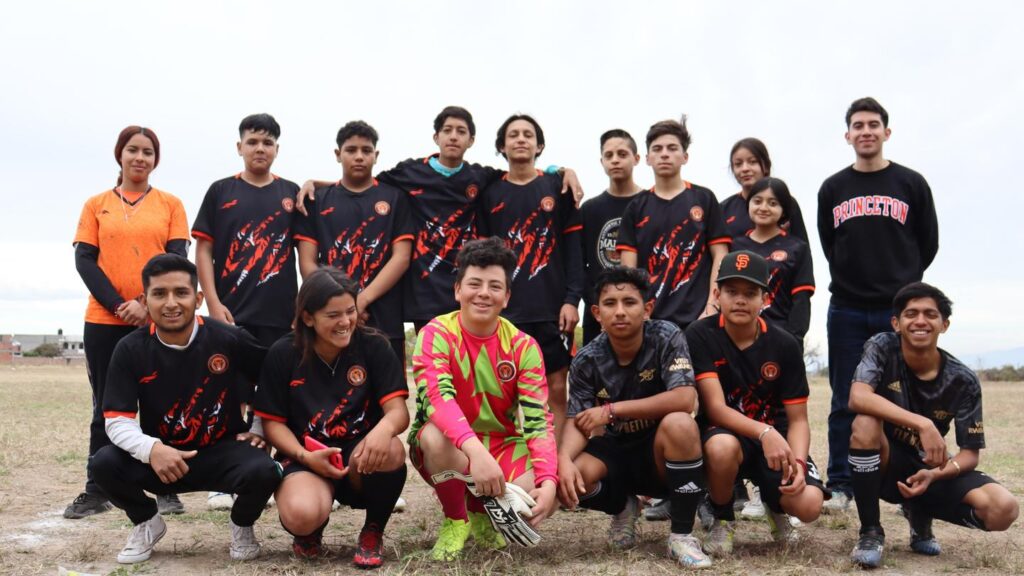
It takes a village: Projects for Peace winner Carlos Cortez ’24 and the people of Zináparo bring music and soccer to their youth
Jan 23, 2024
It takes a village: Projects for Peace winner Carlos Cortez ’24 and the people of Zináparo bring music and soccer to their youth
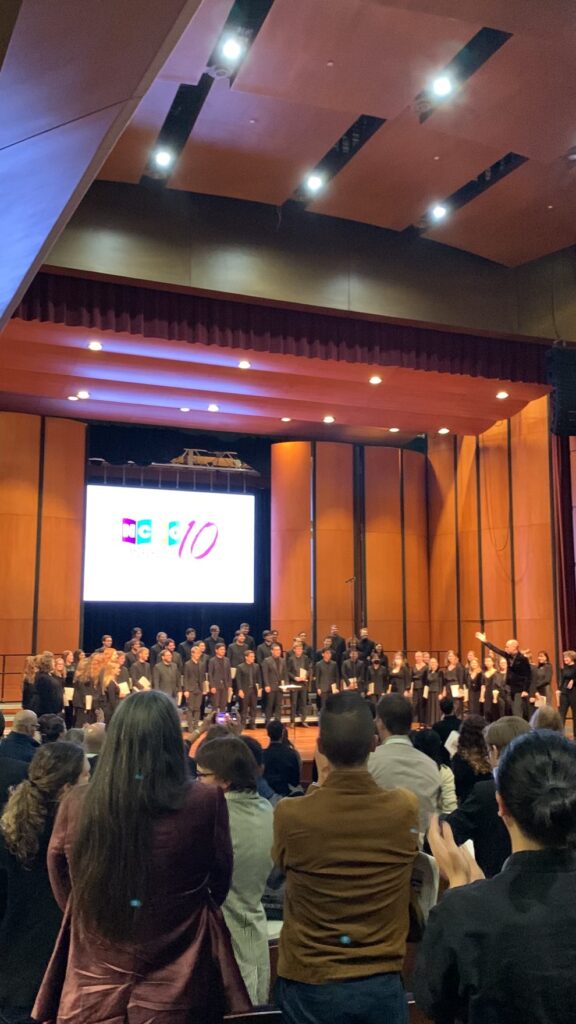
Princeton University Chamber Choir and Alumni Perform at National Collegiate Choral Organization Biennial
Dec 12, 2023
The Princeton University Chamber Choir, joined by twenty-five alumni, recently made their mark at the National Collegiate Choral Organization (NCCO) biennial conference.

